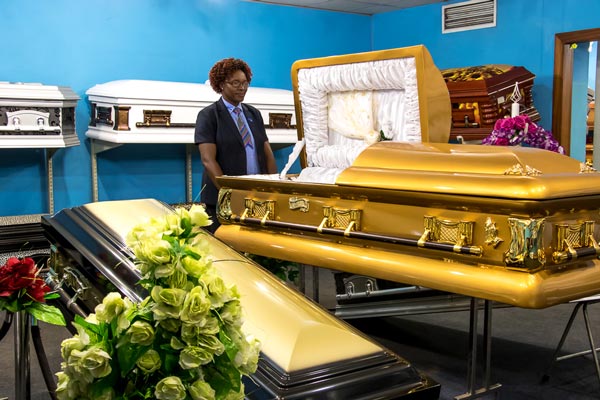

BY JAIROS SAUNYAMA
Sporting a blue work suit and safety shoes, Margaret Nyakudya (50) is the centre of attraction at a funeral wake in Mt Darwin.
The male villagers cannot help it, but are surprised by her bravery as the mother of two neatly executes her duties, leaving mourners with questions about her chosen career.
Dealing with corpses is an unusual calling. It is a job not for the faint-hearted, but Nyakudya has defied the odds by becoming one of the few female funeral assistance personnel at Doves Funeral Services.
Doubling as both a mortician and undertaker, the soft-spoken woman has buried close to 1 000 corpses, a feat which some of her male counterparts are yet to achieve.
The Standard People caught up with Nyakudya recently at her workplace where she revealed the secret behind her career.
“I love my job and it defines who I am. I understand the fears associated with dead bodies, but this is the route I decided to take. I am privileged to be one of the most brave and fearless women on local soil,” boasted Nyakudya.
In other cultures, it is sacrilegious for a woman to “deal with corpses”, but Nyakudya has defied the odds through burying bodies of sangomas, prophets, the rich and famous, among others.
- Chamisa under fire over US$120K donation
- Mavhunga puts DeMbare into Chibuku quarterfinals
- Pension funds bet on Cabora Bassa oilfields
- Councils defy govt fire tender directive
Keep Reading
A class four driver’s licence holder, she has travelled overnight to distant and marginalised areas to bury the departed ones.
She, however, cannot forget one of the most daunting tasks in her career when she met a stubborn wild animal on her way to a funeral wake.
“There is this place between Kariba and Chinhoyi, it’s too remote. At around 7pm, a wild animal that appeared like a jackal stood still in front of the vehicle,” she recounted.
“I tried to scare it away through flashing the lights, but it didn’t work. The animal was so stubborn that it would go along the road and stop at short intervals. It took time for the animal to disappear into the wild.
“The whole journey was marred with strange things. We arrived at a very narrow bridge that demanded extra attention to cross. It was bad.
“The bridge was damaged by the rains and it took sheer bravery and the grace of God to cross it to and fro. We arrived at the intended destination at around midnight.”
Nyakudya, a widow who lost her husband in 2010, says she has endured all the strange things associated with death since some of the bereaved families are deeply rooted in culture and mysticism.
“People have different beliefs and cultures. At some point, relatives can delay the corpse to enter the yard due to some traditional beliefs and rites. But that cannot deter or scare me,” she added.
“The good thing is that I am patient and treat my clients very well.”
As some of her major achievements and memorable moments, Nyakudya has driven and buried the poor, the elite and heroes.
Those who attended the late MDC founding leader Morgan Tsvangirai’s funeral last year might be familiar with Nyakudya as she led the burial proceedings.
“I was there in Buhera to bury the late Morgan Tsvangirai. I travelled by road and collected his body from the helicopter to the homestead,” she said.
“Recently, I travelled to Gwanda for the late Professor (Phineas) Makhurane’s burial.
“I do not celebrate death, but as a woman, executing my duties at such high-profile funerals is a milestone. I have lost count of provincial heroes I have buried.”
With the world turning into a global village as a result of technological advancements, Nyakudya has been guided by her ethics to safeguard the privacy of her clients.
Following the death of music icon Oliver Mtukudzi, a mortician reportedly took a photo of the legend’s body and leaked it on social media, a thing that invited a backlash from the public and the deceased’s family.
“I have my ethics and as a woman I understand these things better than my male counterparts,” Nyakudya said.
“I value my clients and respect their feelings. I am glad that I am not overwhelmed to the extent of pulling out my mobile phone to take a photo in the mortuary or any other place.”
Nyakudya is one of the six female funeral assistants employees at Doves Funeral Services as the company brings in more women to join the male-dominated sector.
“The reason why we have few female funeral assistants is that the sector is male-dominated because of the nature of the job.
“Historically, most females did not have driver’s licences, so it is a job that was not readily taken up by women.”
“However, for the past years we have recommended recruitment across gender and disability.
“During the last year we recruited women as their commitment and care is higher compared to men,” said Trish Jasi, Doves Holdings general manager.
Meanwhile, Nyakudya’s youngest daughter is mulling taking up her mother’s profession.
“It was not easy for my family and relatives to accept my new job as a mortician or undertaker. I am happy that my youngest daughter sees me as a role model and is interested in this job,” she said.
Nyakudya was a till operator at one of the top retail outlets in Harare before she decided to take the bull by the horns.
In January 2013, she joined Moonlight Funeral Assurance before crossing the floor to Doves.
Despite the nature of her job, Nyakudya is scared of death herself.
“I do not want to die, I am afraid of death,” she said.
Today, Nyakudya is a role model to others by taking up a job in a male-dominated profession.










